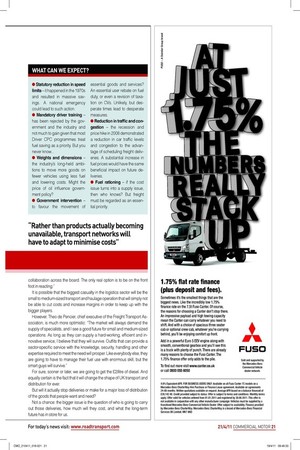“Rather than products actually becoming unavailable, transport networks will have to adapt to minimise costs”
Page 16

If you've noticed an error in this article please click here to report it so we can fix it.
collaboration across the board. The only real option is to be on the front foot in reacting.” It is possible that the biggest casualty in the logistics sector will be the small to medium-sized transport and haulage operation that will simply not be able to cut costs and increase margins in order to keep up with the bigger players.
However, Theo de Pencier, chief executive of the Freight Transport Association, is much more optimistic: “The market will always demand the supply of specialists, and I see a good future for small and medium-sized operations. As long as they can supply a hard-working, efficient and innovative service, I believe that they will survive. Outfits that can provide a sector-specific service with the knowledge, security, handling and other expertise required to meet the need will prosper. Like everybody else, they are going to have to manage their fuel use with enormous skill, but the smart guys will survive.” For sure, sooner or later, we are going to get the £2/litre of diesel. And equally certain is the fact that it will change the shape of UK transport and distribution for ever.
But will it actually stop deliveries or make for a major loss of distribution of the goods that people want and need? Not a chance: the bigger issue is the question of who is going to carry out those deliveries, how much will they cost, and what the long-term future has in store for us.













































